2013 Report
|
|
|---|
The IEA-USP took further steps towards consolidating its institutional project in 2013, which occurred primarily through a series of activities that contributed to reassert the importance of the Institute as a platform for institutional critique, engaged not only in the reflection on the scope and governance of the University but also on its role within it.
In this context, the highlights were the meetings IEA debates USP's President election process and the proposition of a study group on institutional conjuncture. The meetings have exposed and discussed alternative proposals for the President’s election system in force until then. The Group for Institutional Conjuncture has been approved at a meeting called by IEA-USP’s Director, bringing together members of the Institute’s Board and of its Expanded Board soon after the resumption of possession of their premises after 42 days of invasion and subsequent occupation of the administrative complex at the Butantã campus by students last October.
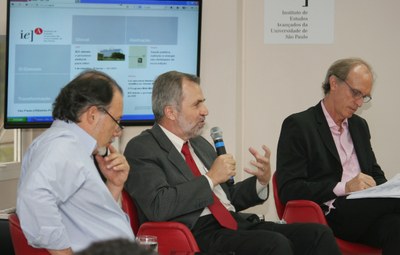 |
IEA debates USP's president election process September 3, 2013 Ciro Teixeira Correia, Luiz Nunes and Martin Grossmann |
|---|
This new study group will promote a broad discussion on the roots of this malaise and propose institutional policies for USP to generate subsidies that are able to contribute to the performance of the managers and the University’s deliberative forums in proposing initiatives and making decisions.
In the aforementioned meeting, held on November 19, an open letter to the universitary community was released, expressing outrage at the acts of vandalism committed by students and reaffirming the commitment of the institute to continue its mission, free from constraints on its activities, to ensure the continuity of its unique role as a place for interdisciplinary dialogue, always contemplating the best academic values, management and coexistence. However, as emphasized by the open letter, permanent headquarters for the IEA-USP continue to be of fundamental importance after 27 years of waiting.
Read: The result of 42 days of ocupation and Board of the IEA publishes open letter about the depredation of USP's central administration and the institute premises.
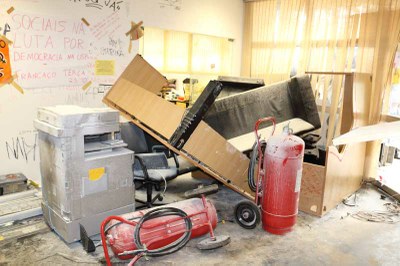
It is noteworthy that many of the IEA-USP activities have been hampered due to the invasion and occupation of USP’s Central Administration buildings, where the Institute is provisionally located since February 2011. In some cases, the cancellation of events was inevitable. The intense pace of work that had been kept by the Institute was discontinued due to lack of infrastructure, which includes a suitable workspace for employees and equipment, and a proper place for the holding and transmission of the events on the web, as is the case of IEA-USP’s newly equipped event room.
However, despite the adversities, the Institute was able to work around the unexpected: during the period of occupation, most of the scheduled meetings were held in other spaces and, where possible, the routine of activities was maintained. To make this possible the IEA-USP counted on the dynamism of its staff, the commitment of its researchers and the support of other units of USP, which were essential. We sincerely thank all of them.
In this permanent and necessary metalinguistic role (see more in Green Room) as an institutional critique platform, the IEA-USP has also organized three events aimed at a comparative assessment of the operation of three institutes of advanced studies from other countries throughout the year. All three are members of the network UBIAS – University-Based Institutes for Advanced Study: the Collegium de Lyon, seat of the Réseau Français des Instituts d'Études Avancées (RFIEA), a network that brings together three other institutes for advanced studies in France (read more in: Collegium de Lyon: advanced studies guided by scientific freedon), and the IASs of the University of Nagoya and the University of Birmingham.
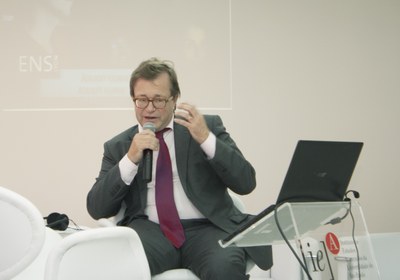 |
The international conference 'The Collegium de Lyon: A French Institute of Advanced Studies' was held by the IEA-USP on May 10. Olivier Faron, the institution's president, spoke about the particularities, operation, and objectives of the institute. Olivier Faron |
|---|---|
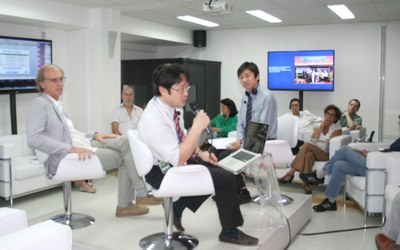 |
The international conference 'The Collegium de Lyon: A French Institute of Advanced Studies' was held by the IEA-USP on May 10. Olivier Faron, the institution's president, spoke about the particularities, operation, and objectives of the institute. Sussumo Saito and Dapeng Cai |
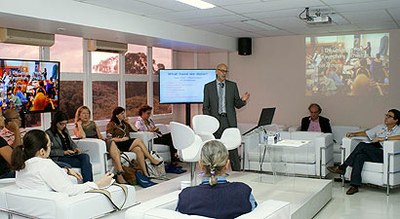 |
Introducing the University of Birmingham's Institute of Advanced Studies: Development and Plans for the Future - April 11, 2013 Malcom Press |
These events are also part of the ongoing but recently renovated programme of internationalization of the IEA-USP, a pioneer model within the University. The IEA-USP is a founding member and integrates the steering committee of UBIAS. In 2013, there were meetings held in Jerusalem and Vancouver. In addition to these, the IEA-USP and the IAR (Institute for Advanced Research) of the University of Nagoya have refined and systematized the project Intercontinental Academy during the past year. The first face to face meeting of this new programme of scientific and cultural cooperation will take place at USP in March 2015.
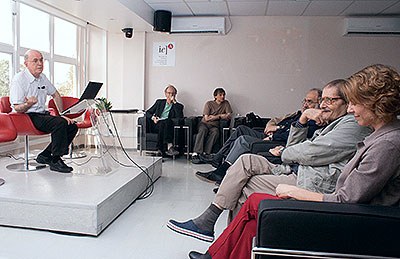 |
Eliezer Rabinovici, conference in August 22, 2013 |
|---|
Another important event in this context was the roundtable Sesame: A Visit to a Parallel Universe, which has been presented by physicist and former director of the IAS of the Hebrew University Eliezer Rabinovici. The Sesame is an international center for research and advanced technology that is being built in Jordan for the benefit for Science from this region in permanent conflict.
Back to Latin America, the renewal of the agreement between the Universidad La Frontera in Temuco, Chile (UFRO), has been very important for the IEA-USP, in particular due to the continuation of the chair Bernardo O'Higgins. Professor Maria Helena Rolim Capelato, of USP’s Department of History and expert in History of America, is the new coordinator of the chair. Marianela Denegri Coria is the coordinator of UFRO, and expert in Economic Psicology.
However, though investing in an institutional perspective (USP and in itself), the IEA-USP did not put aside its tradition of intensely reflecting on issues of great impact on Brazilian reality and, in parallel, discussing topics related to the changes in the international scenario. An example was the creation of a new debate format, molded for critical / reflective / discursive moments that reflect on urgent issues in the “here-now” (Walter Benjamin’s Jetztzeit): the Contemporary Societies Laboratory.
In this environment, four intense meetings have been organised: What's Happening? and What’s Next?, both part of the series ICU Brazil, a special series created to discuss the demonstrations that have taken over the streets of Brazil in June, the debate More Doctors, which addressed the controversies surrounding the “Mais Médicos” programme, launched by the Brazilian federal government in July, and the debate Ethics and Attack, which put into perspective the possibility of a military intervention in Syria by the United States.
|
What's Happening?, June 21, 2013 |
|
|---|---|
|
What's Next?, July 3, 2013 |
|
|
|
More Doctors, September 4, 2013 |
|
|
Ethics and Attack, September 11, 2013 |
The last two events, in particular, are the result of a prospective effort of the IEA-USP to work together with other institutions, whether within or outside the University, nationally or internationally. Domestically, in addition to partnerships with USP’s Institute of International Relations (IRI) and the Faculty of Medicine (FMUSP) for the realization of those two events, USP’s Commission of Ethics has had the initiative to promote the cycle of encounters Ethics and the University.
An important step for the maintenance and expansion of networks of collaboration was the organization, in partnership with the ILEA-UFRGS, of the 2nd National Conference of Institutes for Advanced Study in Brazil, which took place on August 23-24 in Porto Alegre. The first meeting of Brazilian IASs was held at IEA-USP on October 31, 2011.
The IEA-USP fully resumed its programme for visiting professors in 2013. The Institute counted on the collaboration of six researchers. During their stay, they have worked on their research project, some of them related to IEA’s research groups. They have participated in activities held by the Institute, and proposed and organized events.
Anthropologist Massimo Canevacci has participated in the activities of IEA’s Environmental Politics research group and coordinated a series of meetings on digital culture throughout the year, many of which with the participation of international speakers. Among these meetings, the conference Technology: the New Totemism deserves to be highlighted, having had Derrick de Kerckhove, disciple of Canadian theorist Marshall McLuhan, as exhibitor. Canevacci has also actively participated in the debates launched by the Contemporary Societies Laboratory and in those motivated by the student’s invasion.
IEA’s Philosophy, History, and Sociology of Science and Technology research group has received the contribution of visiting professor Hugh Lacey, who organized the 24th International Seminar on Science, Technology, Values and Society together with professor Pablo Mariconda. This group has also counted on the contribution of French philosopher Nicolas Lechopier in his second stay at the IEA-USP, a year after his first stay of three months.
Belgian researcher Pierre Descouvemont, supported by FAPESP, has developed extensions of the Continuum Discretized Coupled Channel method for models of microscopic atomic clusters in cooperation with the coordinator of IEA’s research group on Nuclear Astrophysics, Mahir Saleh Hussein.
Canadian ethologist Jerry Hogan, professor emeritus from the Department of Psychology of the University of Toronto, has prepared a monograph which organizes and integrates the results and concepts obtained by the new specialties of his field of research, such as cognitive psychology, neuropsychology and behavioral genetics.
Uruguayan sociologist Bernardo Sorj began his term as visiting professor in the middle of last year, contributing directly and actively in discussions sponsored by the Contemporary Societies Laboratory, which also served as a basis for his drawing-up of a programme of debates proposed for 2014 and entitled In Search of Lost meaning: interdisciplinary dialogues on science and transcendence.
Regarding the performance of IEA’s groups throughout the year, special emphasis is given to the work of the research group on Amazon Transformation: History and Perspectives, aimed at creating the Rainforest Continent Business School. It is an initiative towards the training of human resources in sustainable business in the Amazon region, which has as key concepts an economy that considers the standing forest and a geopolitical viewpoint of tropical forests as a continent. Three large roundtables have been organized to present the project and discuss ways to make it operational: one in São Paulo, one in Washington and a third one in London. The project was also presented at the event FAPESP Week North Carolina in Charlotte, Chapel Hill and Raleigh, North Carolina, in November.
In addition to the advances in the context of institutional critique, research and brainstorming, 2013 also marked the year of launch of IEA-USP’s new website on April 11. Now with versions in Portuguese and English, the site was being managed since Autumn 2012, when 16 members of the Institute’s staff started working on structuring the homepage, information architecture, formatting and preliminary content insertion.
Organized around the four meta-curatorships mentioned in the institutional project 2012-2017, the site uses Plone, a platform of open-source Content Management System (CMS), and offers easy access to the collections of videos, audios and texts produced along the trajectory of the Institute. The results derived from the statistics of access clearly demonstrate the advances and benefits that this site has brought to the mission of the IEA. Still in the area of disclosure of activities, it is worth remembering the reformulation of IEA’s Newsletter (sent by email to 33,000 readers), which is now released in Portuguese and English.
|
Videos and photos of the events held at the IEA-USP can be accessed here. |
|---|
In terms not only of disclosure but of publication of research results developed within the IEA and the active role that the Institute plays in the sphere of science and knowledge, nationally and internationally, we highlight the Jabuti Award in the Natural Sciences category earned by the book "Polinizadores no Brasil: Contribuição e Perspectivas para a Biodiversidade, Uso Sustentável, Conservação e Serviços Ambientais", produced by IEA’s research group on Ecosystem Services. Read more about the project. Another publication was the series of four issues of the journal "Scientiae Studie", by IEA’s research group on Philosophy, History, and Sociology of Science and Technology, which since 2013 has the support of the IEA.
This presentation could not fail to highlight the always relevant work of the journal "Estudos Avançados". Under the enthusiastic and meticulous direction of professor Alfredo Bosi, its editor, three more issues of the journal were released in 2013. In their content, dossiers on Neuroscience, Energy, Public Health, Nutrition and Poverty, Environment, Public Transport, The Place in Social Life, and Culture and Popular Music. All 79 issues are available in digital format online. From 2007 their main articles are also published in English.

